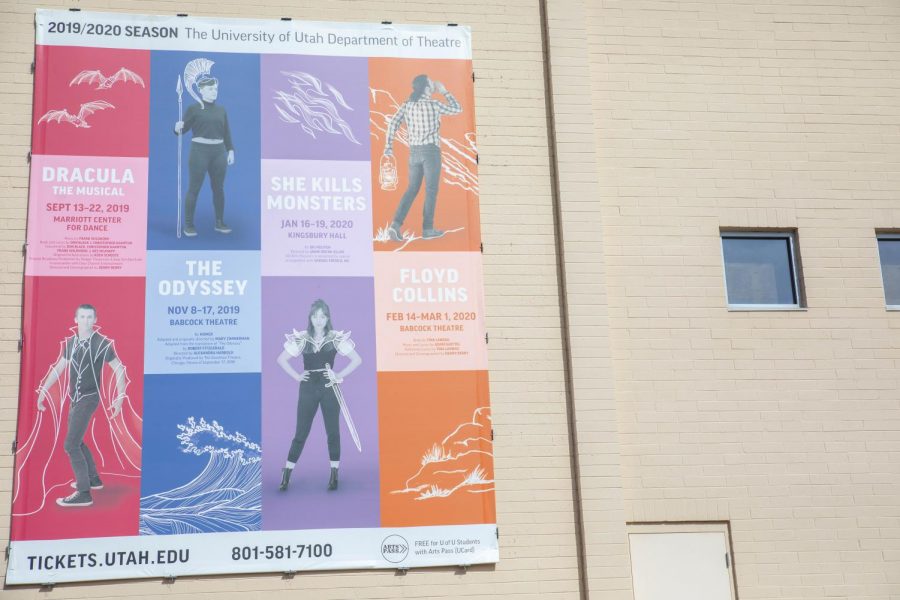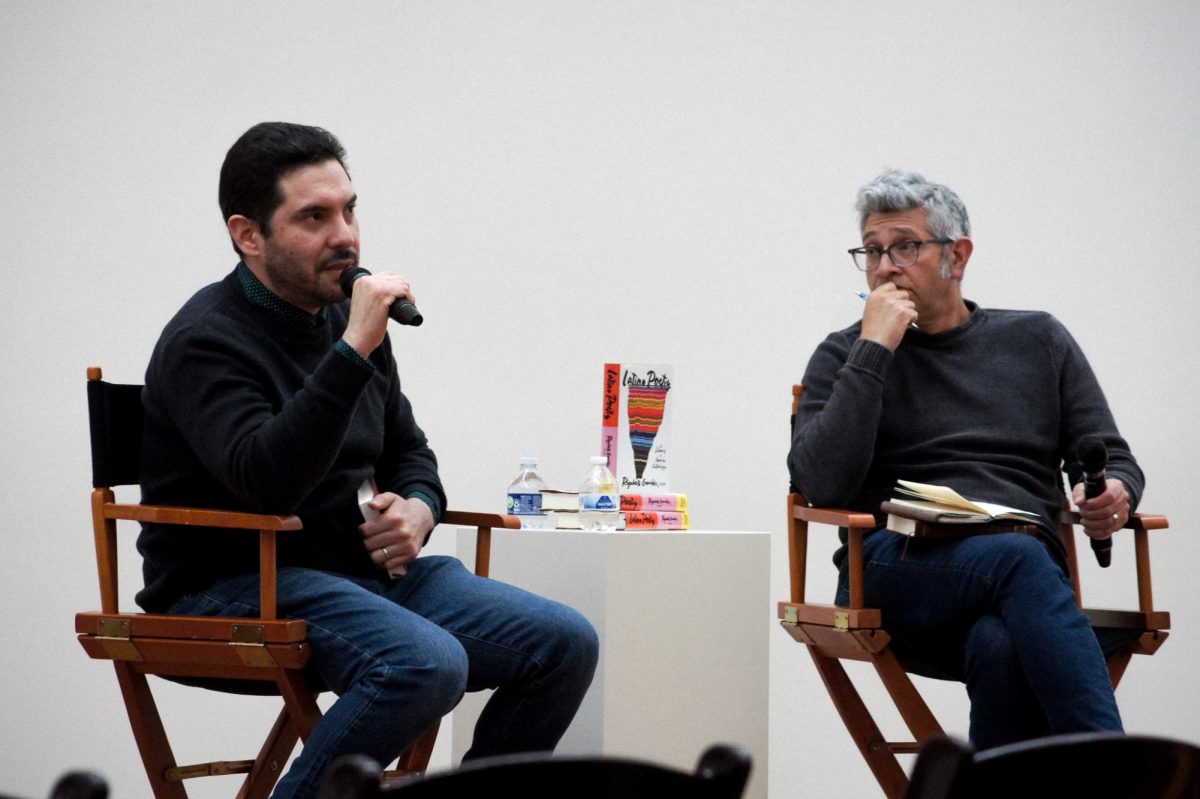Misinformation, Truth and Facts in Theater
April 13, 2020
In an era full of misinformation and “fake news,” these themes are bound to seep into the arts. Plays, movies, tv shows, music and other artistic mediums have a unique role in society as they can provide an escape from the stressful world, but — simultaneously — the arts can also reflect the issues we see and can challenge us to think critically about the status of our world. At the University of Utah, the Babcock Theatre hosted a production of “Floyd Collins” in February, and in November the Pioneer Theatre Company showcased “Lifespan of a Fact.” These two plays feature themes of misinformation and debates about the truth — and the messages of these plays reveal the importance of the arts in contemporary issues.
Falling into Misinformation Traps
In 1994, Tina Landau wrote “Floyd Collins” — which is accompanied by music and lyrics from Adam Guettel. This musical explores the real life of Floyd Collins, who met a tragic end while cave exploring in rural Kentucky in 1925. In its production at the U, Denny Berry, the head of the Musical Theatre Program, served as the director. As a part of her reasoning for choosing to produce “Floyd Collins” during this year’s theatre season, Berry said, “I want the audience to go through this process of seeing this retelling of a media event. This is where it started and it has only gotten worse in today’s age with Facebook and Twitter.”
The historical case of Floyd Collins’ tragedy was unique — it was one of the first events where members from the media were able to travel to a location and report back on what they found. But now, as theatre makes this historical example more accessible, it is clear to see the pervasive nature of misinformation in the media throughout the years.

In Hannah Keating’s dramaturgical note within the “Floyd Collins” program, she writes, “Floyd went into the Sand Cave hoping to become a sensation — alas, he succeeded, howsoever tragically. Almost a century later, ‘Floyd Collins’ asks us not only to evaluate our relationship to media today but also to think twice about seeking glory.” (Keating is also a writer at the Daily Utah Chronicle.) As Collins withers away within the cave system, trapped underneath a boulder, reporters descend upon the rural town in search of a story. The reporters sing, “Is that remarkable?” as they pester the locals for clickbait-esque headlines and stories to write. The reporters distort small pieces of information that they overhear into completely misconstrued articles — in one instance, a reporter hears someone remark that they are “freezing,” but in the game of telephone that they are unknowingly playing, the reporter hears this as “he’s free,” mistakenly reporting that Collins has escaped the trap of the boulder.
As this play continues to be performed in today’s time, it is impossible to view these scenes without thinking about clickbait, misinformation and distortion within the media. On this idea, Berry said, “Art brings awareness to modern issues. Theatre illuminates the human condition. It needs to ask questions — it may not solve problems, but theatre should bring up ways of looking at particular situations that have perhaps not been illuminated before.”
Valuing the Facts or the Truth
Earlier this year the Broadway hit play “Lifespan of a Fact” came to the Pioneer Theatre Company, and although the play is based on a true story, this term is called into question as the play progresses. In his director’s note, Wes Grantom writes, “This is a play adapted by three playwrights, from a book by two authors, based on an essay by one author who freely admits he ‘nudged’ the facts… This play is the literary equivalent of a tiny Russian doll nesting within different versions of the ‘truth.’ Is one version more true than another? Is one more factual?”
As “Lifespan of a Fact” progresses, fact-checker Jim Fingal attempts to clarify and rectify John D’Agata’s essay so that it is fit to meet the publishing standards set by his editor, Emily Penrose. D’Agata adamantly defends the creative liberties he’s taken while Fingal, a vigorous fact-checker, goes so far as to travel cross-country to verify certain statements. The essay, while stretching the truth, is a well-written piece about suicide and American identity. D’Agata firmly states, “I’m not interested in accuracy. I’m interested in truth.”
“Lifespan of a Fact” demands that we consider the differences between objective facts and emotional truths. Does one have greater value over another? But besides these philosophical debates, this play also begs us to reconsider whether we can trust what we read in the media. Just because something has been published does not always mean that it can stand up to rigorous fact-checking. We hope that what we read is the truth, but in some cases, it may be difficult or impossible to determine or separate what is factual from other truths. Yet, just as the world exists within a gray area, this play offers arguments for both sides, and in the end, it’s up to the audience to decide which way the story ends. Does the essay with emotional truths get published, or is it rejected because it is too factually inaccurate?
The heart of “Lifespan of a Fact” hits closely at the issues about the sources of our information. For most people, the processes behind writing a story and its publication remain a mystery, but it is important to enlighten these areas as our world confronts misinformation nearly every day. “Art, at its best, plays a pivotal role in shining a light on the issues we face as a society. The reason we make art and tell stories is to help us look at the world from a different angle and hopefully see it in a new way,” Grantom wrote in an email interview. “Lifespan of a Fact” offers this new angle to take a closer look behind the curtain of the publishing world, and — hopefully — with this new perspective, people might become more aware of the pervasive nature of misinformation within the media.

Moving from Art to Reality
In both cases, as I left the theatre after “Lifespan of a Fact” and “Floyd Collins,” I found myself speechless. Theatre allows you to experience a live recreation of a story in an environment that demands active audience engagement. So when it’s time to leave the building, it’s impossible to refrain from applying these stories as a lens to our everyday lives. With such moving and topical storylines, these plays — along with countless others — require and inspire personal reflection. The arts might bring attention to modern issues, but theatre immediately prompts audience members to reflect upon their own lives and interactions within society.
“Lifespan of a Fact” opens with the quote, “True words are not beautiful. Beautiful words are not true,” from Lao Tzu. However, in looking at these examples from “Lifespan of a Fact” and “Floyd Collins,” the theatre, and possibly the arts in general, offers a beautiful setting in which we can experience truth — whether it be emotional or objective.












